Kilimanjaro Local Guide Services is the main issue that will determine the best services on mount Kilimanjaro. We have best crew on Kilimanjaro ensuring best service on mount Kilimanjaro. Imagine waking up on a high on Kilimanjaro on the 6th of your Kilimanjaro Climbing, a friendly man who might hand you a cup of coffee, another might refill your water bottles. Also after climbing up to 15,300 feet over the course of the day, you find camp and dinner waiting for you. Those friendly faces belong to the Kilimanjaro Porters. Their attentive work keeps you hydrated, fed, sheltered and safe during Climbing Mount Kilimanjaro. Kilimanjaro Porters have the major role to make your Climbing Mount Kilimanjaro successful. Together, Kilimanjaro Porters carry equipment and supplies up Kilimanjaro and give climbers the support they need to reach the summit. Without them, getting to the Top of Africa would be almost impossible.
Kilimanjaro Porters and Guides have the major role to make your Kilimanjaro summit successful. Kilimanjaro Porters are the real heroes who would be able to help you get to the summit successfully. The porters carry the gear of climbers and make it easy for them to climb Kilimanjaro. Sometimes the porters work in Kilimanjaro Rescue team in case of any mishappening.
RLAT Private Kilimanjaro local guides are highly experienced, medically trained and committed to your safety. With Real Life Adventure Travel, Safety is our number one priority.
The importance of your Kilimanjaro crew cannot be underestimated. A quality guide and porters will make for a wonderful time on the mountain, while a mediocre staff can put your life in danger.
Be notified that, some companies employ guides who lack advanced medical training, industry certifications and proper safety equipment. Additional, they hire a guide solely, while the rest of the crew remains unknown as the guide himself contracts them. Climbers may end up with inexperienced, part-time, or even dishonest people accompanying them on their climb.
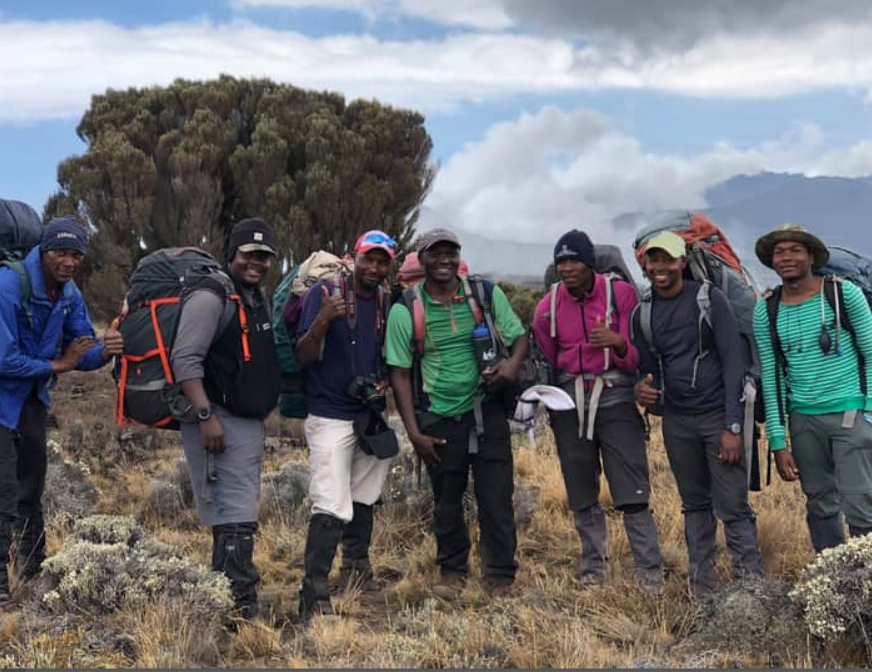
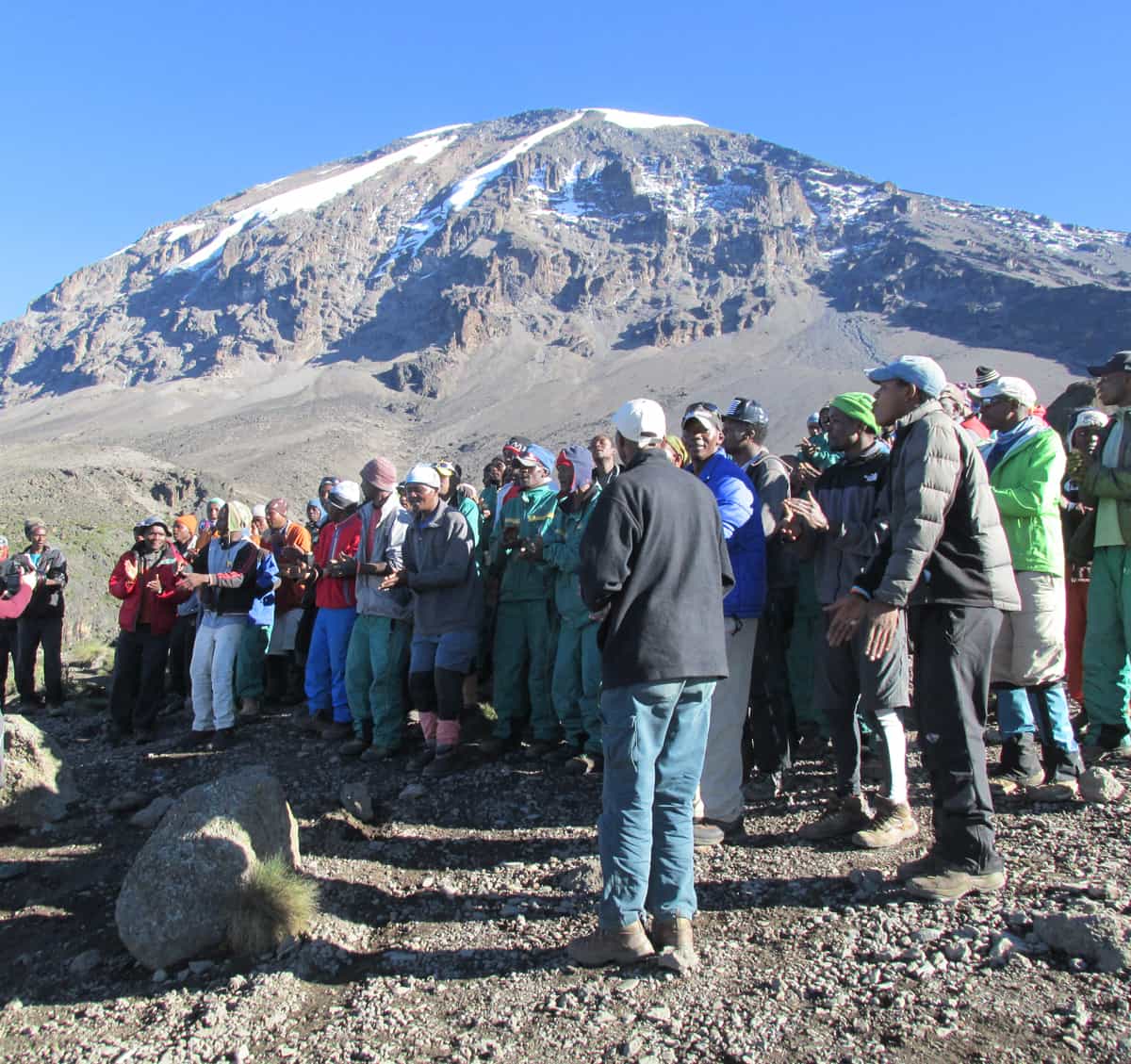
We spend a great deal of attention to finding the right staff.
Each employee, from the lead guide to porter, are been screened intensively prior to hire, and only the top performers are retained. Because of this rigorous process, we can ensure professional, high quality, consistent performance across the board. This is very rare among Kilimanjaro operators. We are one of only a handful of companies that operate this way. Though certainly more expensive and laborious for us, knowing that our clients are on the mountain with the best crew makes the process well worth the time and effort.
When you climb with Real Life Adventure Travel, you climb with the best crew on Mount Kilimanjaro.
We only hire the best, most accomplished, experienced local Kilimanjaro guides.
Our local Kilimanjaro guides are experts on the mountain. Each of our guides is licensed by Kilimanjaro National Park, speaks English fluently, and leads climbs on Kilimanjaro on a regular basis. By guiding around 20 expeditions per year, their knowledge and skills are consistently tested and strengthened. Most have summited Kilimanjaro between 100-300 times! They know how to lead clients to the top, safely and professionally.
Importantly, our Kilimanjaro climbs staffed with a ratio of one guide per two clients. We believe this level of attention increases the success rate and safety as each climber receives a high degree of personal interaction, evaluation, and encouragement.
We believe that safety is the most important aspect of the Kilimanjaro climb experience.
It is our job to keep you safe on Mount Kilimanjaro. When climb with us, you literally trust us with your life. We take this responsibility very seriously. So we provide our guides with the most up to date medical training on high altitude medicine and mountain rescue.
You might think that all guides on Kilimanjaro receive the same training. That is partly true. To be licensed by the park authorities, guides must complete coursework in various aspects of guiding, including medical instruction. This is basic education and the minimum knowledge required to be a certified guide. Many do not receive any additional training and pick up tidbits as they gain experience on the mountain. This is not ideal, yet is the standard for most Kilimanjaro companies and their guides.
Our local Kilimanjaro guides start with first aid training from Kilimanjaro National Park, but it does not stop there. Each guide certified as a Wilderness First Responder and then receives advanced training from IFREMMONT, a European high altitude medical training organization. Every year, multiday training courses held off-site to reevaluate and refresh their knowledge.
This extensive training program assures that our Kilimanjaro local guides are ready for any situation they encounter.
Our Kilimanjaro Local Guides Qualifications
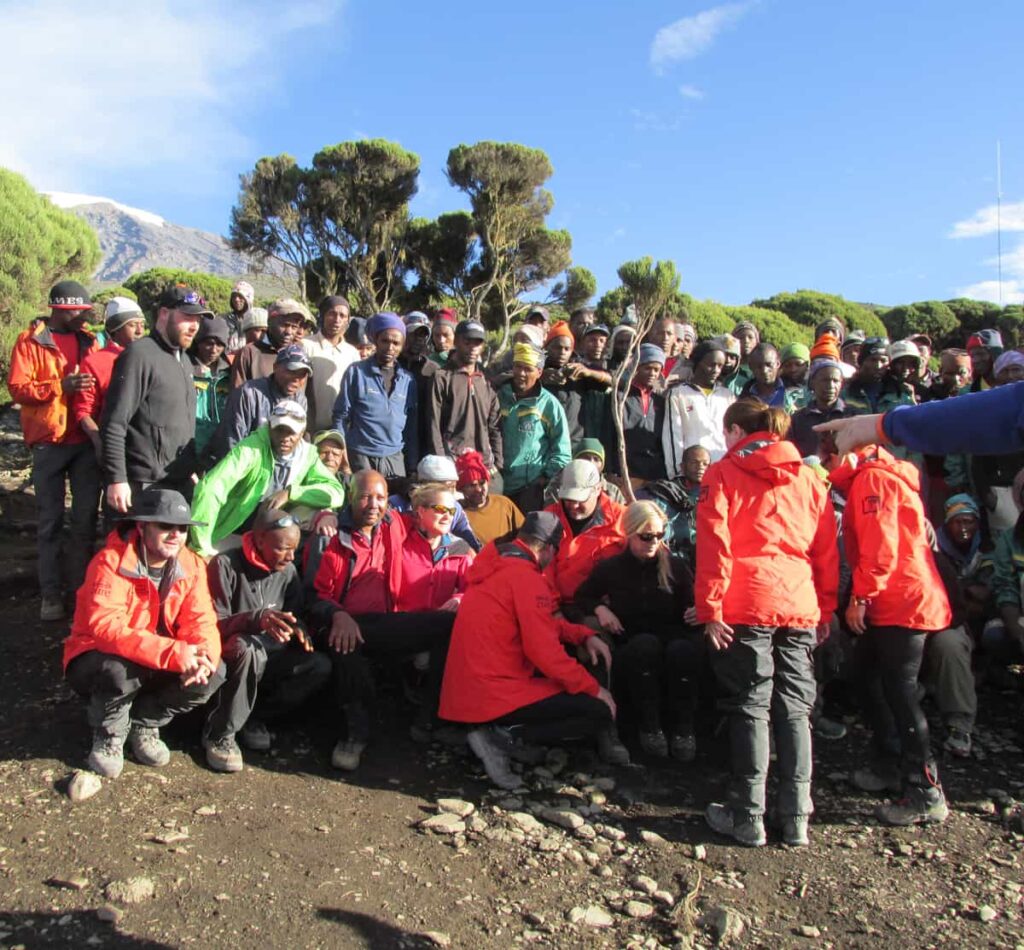
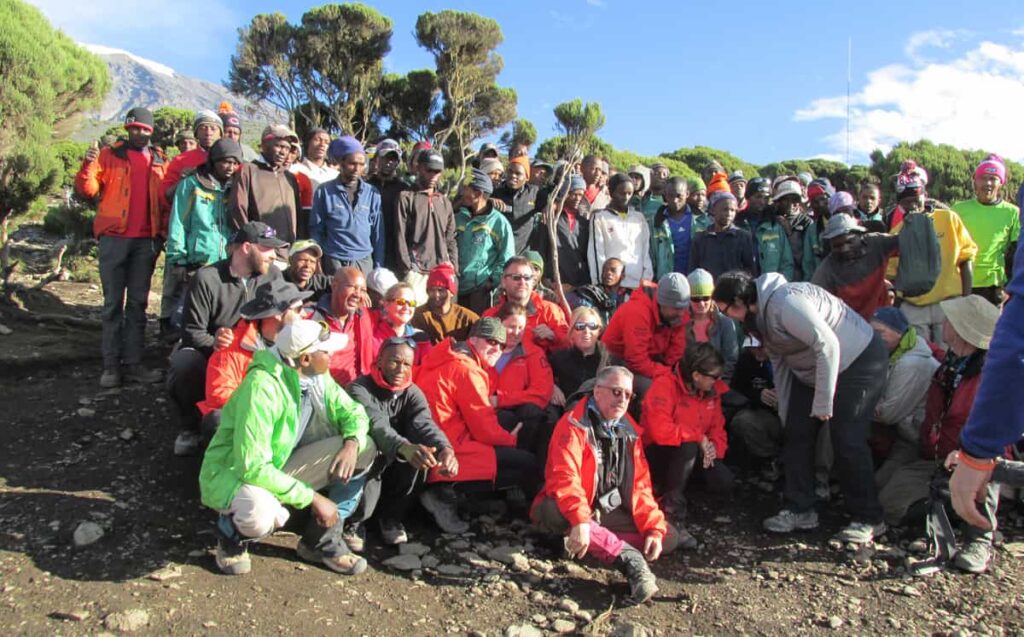
What makes a Kilimanjaro Local guide different from the other popular climbs?
The hikers’ responsibility is to actually hike and enjoy the views of Kilimanjaro around them.
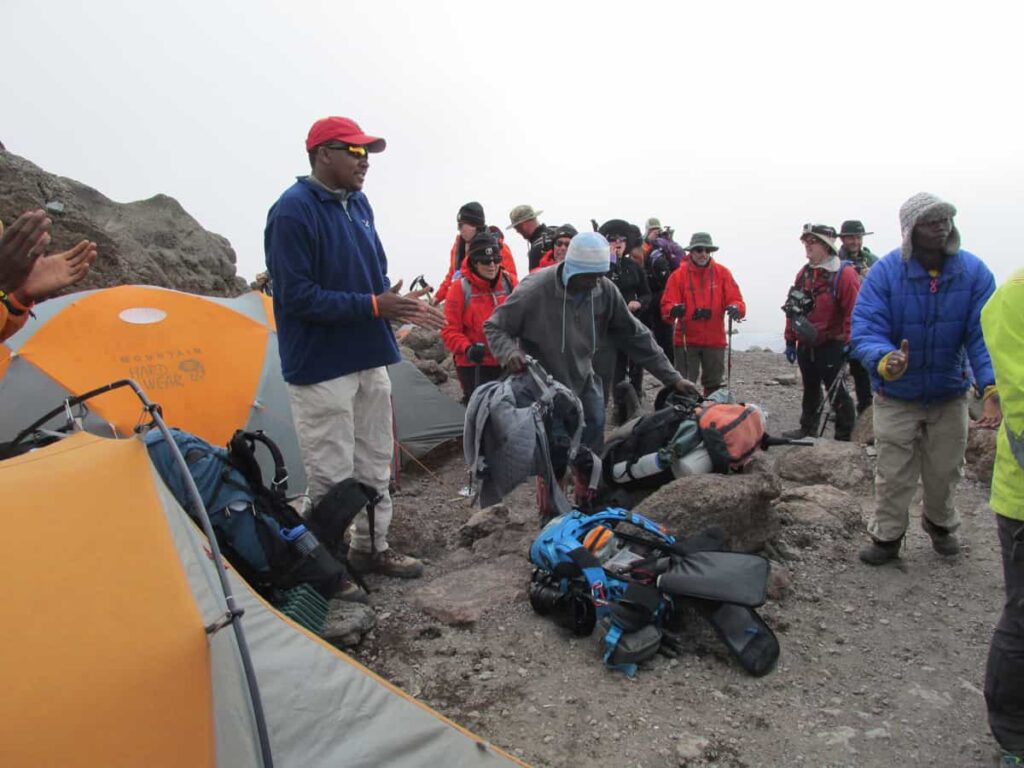
The mountain trekking regulations do not say that it is obligatory to hire porters, yet it is porters, who make the experience safer and more comfortable.
Kilimanjaro porters are the backbone of every expedition and a very special breed of mountaineers, whose physical fitness and stamina always draw the surprising looks of Kilimanjaro trekkers. Trudging uphill, the exhausted hikers are often astonished to see the galloping team of porters, heavily loaded with camping equipment, seeming to have no difficulties whatsoever.
The porter crews have many important responsibilities, such as:
Due to the booming tourism industry, many people from all over Tanzania flock to the Kilimanjaro area in search of work. Because the entry-level requirements are quite low, portering has become one of the most popular occupations here. In order to be allowed to work as a porter on Mt Kilimanjaro, an applicant just has to pay the fee of TSH 8,000/ (about USD 3.5), for a porter’s license.
The number of those seeking work as a porter is much higher than the number of Kilimanjaro expeditions and every year the workforce rises further. Anytime you come to the trailhead of Machame and Marangu routes (the most popular routes on Mt Kilimanjaro), you will see many young people desperately waiting to be hired on the spot.
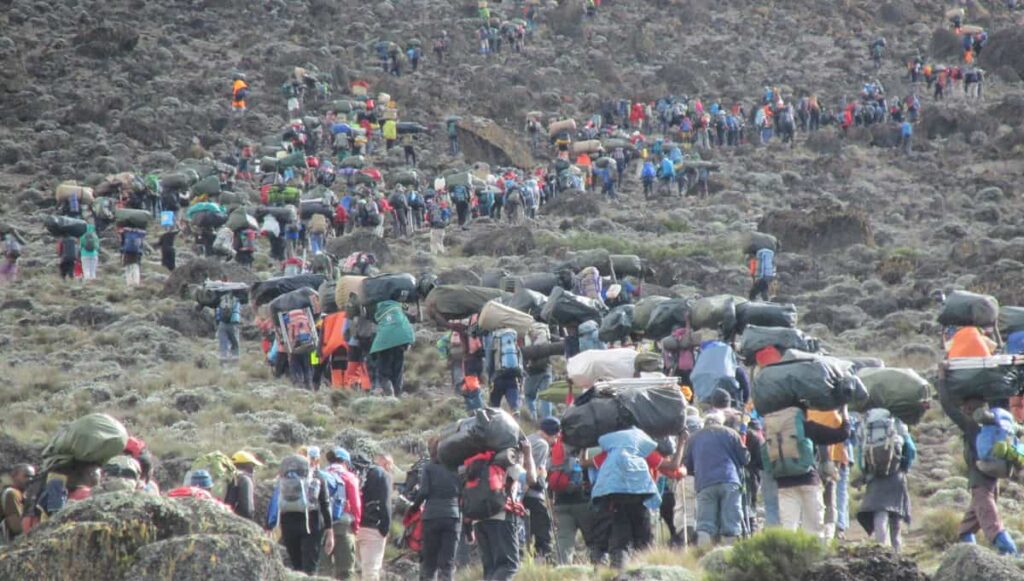
The fact that the labor market is oversaturated opened the way for all kinds of abuses. In order to get hired, the porters often agree to work for lower wages than normally accepted in the industry. They may agree to work for minimal pay and sign up for the expeditions with substandard equipment, scanty meals and no team support.
Regrettably, in order to be able to offer a much lower price to the clients, some budget companies do not pay the required minimal salary and do not invest in the equipment and safety of their teams.
Note that, by seeking to book cheap you contribute to the proliferation of poor mountaineering standards in Tanzania. The mistreatment of porters will not stop until the demand for cheap Kilimanjaro climbs is no more.
The proliferation of the unlicensed, garage-based Kilimanjaro “operators” has led to the following plights of the porters:
Carrying more than allowed Under the rules of Kilimanjaro National Park, each porter is restricted to carry no more than 20 kg. Some companies, however, are finding creative ways to сheat the rangers, and, eventually some of the porters end up carrying 30 kg and more, which is not just dangerous for them, but also deprives other porters of work.
Here at A we follow a well-established maximum of 20 kg per porter. All of the socially responsible companies are doing the same. Apart from being checked by the park rangers upon entry to the Kilimanjaro trails, the load of our porters is carefully checked by our Kilimanjaro guides and their assistants.
Poor meals. A one can easily imagine how much energy a porter needs to perform his job well. However, the meals of the crew is another area where budget companies try to save money. Thus, the situations when a porter receives just two (or even one) meals a day are commonplace here. Most of the companies seldom (or never) include meat into the porters menu, restricting their diet to ugali (local stiff porridge) and some beans at best.
Our porters receive three nutritious meals every day, and apart from ugali and beans, their diet includes meat (goat and beef), eggs, potatoes, rice, spinach vegetables, tea, and bread. A simple menu, yet rich in calories and carbohydrates. And we can proudly say that our porters never go asleep with an empty stomach.
Shoddy tents. Many budget companies are using inferior tents. As a result, their porters often suffer from hypothermia when the weather becomes bad. Every year some of them die, but the climbers are seldom aware of that.
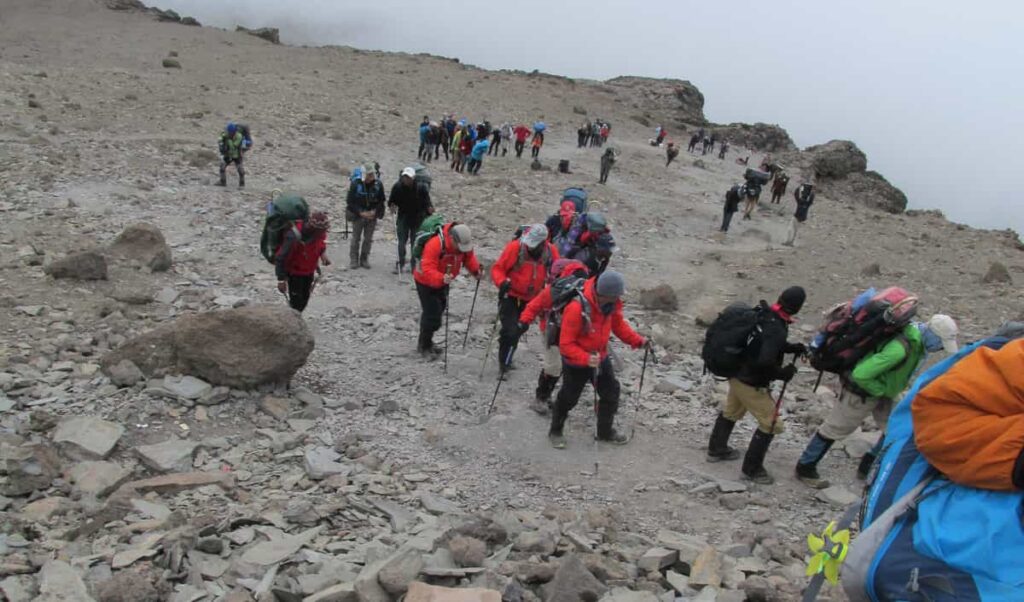
The porters of Real Life Adventure Travel sleep in good-quality, sturdy, custom-designed tents, which provide good protection from inclement weather and draughts. Each hiker is welcome to visit the porters’ area at one of our high-altitude camps on Kilimanjaro and inspect their living conditions.
Low-grade equipment. We can confidently say that almost all porters working on Mt Kilimanjaro are freelancers, meaning that each one is supposed to have a set of necessary gear to be able to find work. Who regulates this and determines that their gear is up to standard and that they have all the necessary equipment for a safe climb?
All of the porters on Real Life Adventures climbing teams have the appropriate gear, which is checked to be safe and up to climbing standards. We do not allow our porters to climb with low-grade equipment because we care about the safety of our staff.
No, you can not. Under the National Parks Mountain Climbing Regulations of Tanzania each trekking group should be accompanied by a licensed guide.
Under the law, the porters are not a requirement – their participation in the expedition is mostly a result of the evolution of the climbing industry. Some of the Kilimanjaro outfitters are offering “light” packages, where you will be accompanied by the guide only. Yet, this option is suitable for the experienced climbers only, who have taken part in other high-altitude trips and know how to set up a camp, cook meals at the altitude and otherwise survive in the wilderness. These climbers should be also physically fit and capable of carrying up to 20 kg of the expedition supplies and gear.
© 2024 All Right Reserved – Real Life Adventure Travel.